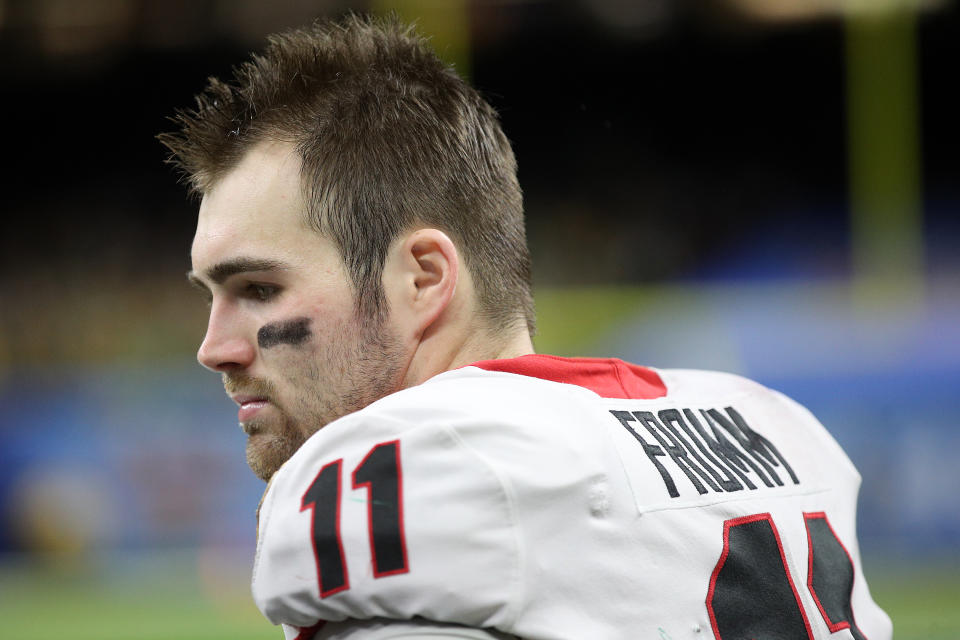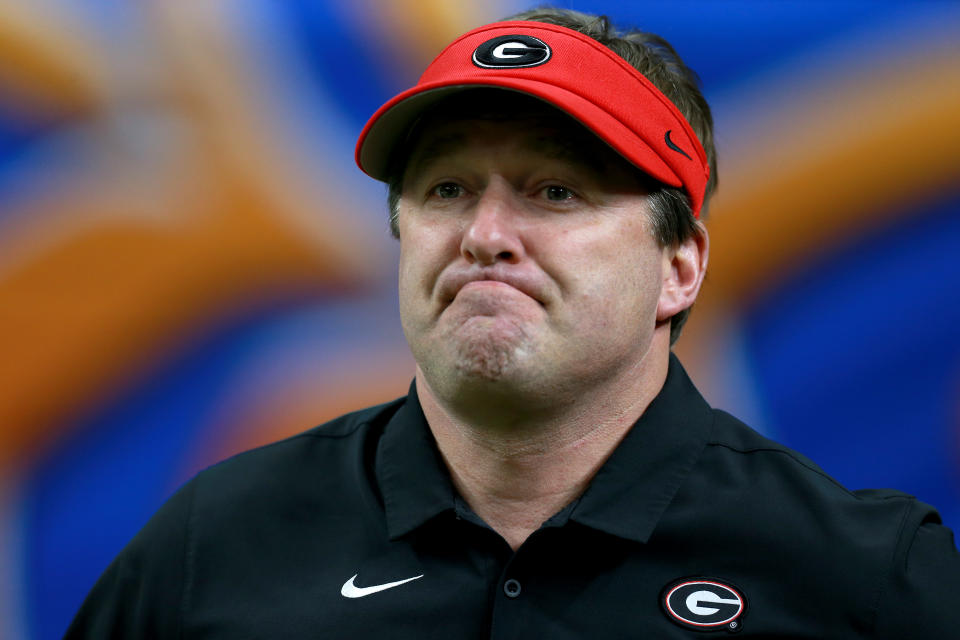How Jake Fromm became the NFL draft's biggest freefall and what it means for Georgia
As Jake Fromm slid into infamy on Saturday afternoon, Georgia fans were there wincing along with him. For as bad as it was watching Fromm leave Georgia early and end up being picked in the fifth round by the Buffalo Bills at No. 167 overall, it’ll be worse watching former Georgia quarterback Justin Fields — now thriving at Ohio State — go in the top 10 next season.
As Fromm’s slide became the hot talking point during the final day of the 2020 NFL draft, it underscored the obvious. Fromm should have returned to Georgia for his senior year. He’d never be a first-round pick, as his pedestrian arm and physical traits aren’t what the NFL is looking for. His poor NFL scouting combine performance buried him in a hole he couldn’t escape, as the coronavirus pandemic kept him from impressing teams on “30 visits,” in-person workouts and at a pro day. This became a draft where teams relied on tangibles, hurting those with elite intangibles like Fromm.
Fromm’s plunge this weekend highlights the glaring flaw — one of the few — in Kirby Smart’s four seasons at Georgia. Smart’s offense is headed into its third offensive coordinator in three years, coordinator uncertainty that’s trending toward Will Muschamp-like levels.
And that means Smart’s program both couldn’t find a way to maximize Fields’ talent, something that Ryan Day did immediately in Columbus, and also that he couldn’t find a way to build a talented enough offense to accommodate Fromm, the player who beat out Fields in 2018 and prompted the No. 1 quarterback recruit’s transfer. Smart had a pair of aces in his quarterbacks room, but somehow ended up having to fold his hand.

All this may be more of an inconvenience and nuisance for Smart, as there will be consecutive years with what-could-have been noise around draft time at the quarterback position. Will that be enough to cause reputational damage? It’s difficult to say. That depends much on Georgia’s ability to get more out of the wide receiver position, the arrival of Todd Monken from the NFL and the impact of Wake Forest graduate transfer Jamie Newman. (Also, of course, the development of blue-chip freshman Carson Beck.)
Georgia’s sputtering offense
Why didn’t Fromm go back to Georgia to help his cause? And why did he fall so far?
Those questions have two entirely different answers. Part of the reason Fromm left Georgia is because the offense wasn’t suited to highlight his skills. Or anyone’s skills, really. He escaped an offense inhibited by a talent deficiency at wide receiver, inexperience at coordinator and nagged by a lack of creativity. Sure, there were two first-round picks at tackle and the electric D’Andre Swift. But there was little else, allowing defenses to stack the box.
“I don’t think there’s any question the offense held him back,” said an opposing defensive coach familiar with Georgia’s scheme. “Anytime you have a change at the coordinator position and it’s new, there’s going to be growing pains.”
That pain came when Jim Chaney left for Tennessee after the 2018 season and Smart replaced him from within with James Coley. The move was widely regarded as one to maintain recruiting momentum, mistakes we’ve seen set back South Carolina and N.C. State in recent seasons.
Coley had success as a play-caller in his past, but Georgia’s offense regressed significantly. It dipped from 37.9 points per game to 30.8, and Coley was in serious trouble after a 20-17 double-overtime loss to South Carolina in October.
Fromm’s unfiltered view of the offense in 2019 has never been voiced. But he spoke with his actions, declaring for the NFL draft on Jan. 8. From 2018 to 2019, his completion percentage dipped by nearly seven points (67.4 to 60.8), he threw six fewer touchdowns (30 to 24) and attempted 78 fewer passes (385 to 307).
Georgia hired Monken, who was last with the Cleveland Browns, less than 10 days after Fromm left. How much of that information was back-channeled to Fromm is unknown, but the Bulldogs being in the coordinator market wasn’t exactly a state secret. (Coley is now coaching tight ends at Texas A&M, which speaks to his market as a play-caller.)
Whatever went wrong on the field couldn’t be massaged in time. Fromm started 42 of his 43 games. He’s from the state and a return could have sealed iconic status, something he nearly delivered his freshman season until Tua Tagovailoa came off the bench in the national title game and delivered a walk-off victory for Alabama.

Fromm’s rocky pre-draft process
Whatever brought Fromm into the draft process, it didn’t go well for a 6-foot-2, 220-pound quarterback with an unspectacular arm. He threw poorly at the NFL scouting combine in February, which was only further highlighted by throwing between the howitzers of Jacob Eason — who he beat out at UGA — and Justin Herbert.
“Heady kid, great football IQ and a winner,” one coach said. “Probably slid because of lack of arm talent.”
There was just one quarterback chosen between pick No. 26 and pick No. 122. And that was Jalen Hurts by the Philadelphia Eagles at No. 53, perhaps the least popular pick in the entire draft. Part of that is because the NFL draft has adapted a class mentality about quarterbacks: They are essentially grouped as first-round potential starters, and everyone else.
“Everyone has a belief that you have to have certain measurables at that position physically to be the guy,” a veteran coach said. “Once you get through the top-tier guys, there’s a dip.”
One coach pointed out that with Cam Newton and Jameis Winston available, the backup quarterback position is flush in the league. Why waste draft picks when there are decent available bodies?
It’s hard to find much wrong with Smart’s tenure at Georgia. He’s gone 36-7 the past three seasons, including that overtime loss in the national title game and two Sugar Bowl appearances. That run has been enabled by elite recruiting, as Smart overhauled the recruiting infrastructure and culture to turn it into Alabama East. But there are also nags of under-achievement relative to that recruiting success, especially on offense.
Much like Nick Saban early in his career — especially at Michigan State — Smart is still working his way through the offensive side of the ball. Georgia used Fields in rudimentary and predictable sets in 2018, yet Ohio State required no such training wheels and developed him at hyper speed. Fromm is the quintessential college quarterback who could have been a Ring of Honor legend, but instead his dive into the unknown began with a belly flop.
Fromm could well ease into the role as a heady career backup and make countless millions. Monken could well settle in as coordinator and resuscitate Georgia’s offense from the depths of mediocrity.
But there’s no arguing that UGA had a pair of ace quarterbacks and somehow folded. When it comes to the inexact world of quarterback development, those are the types of stigmas that help program reputations develop.
More from Yahoo Sports:

 Yahoo Sports
Yahoo Sports 